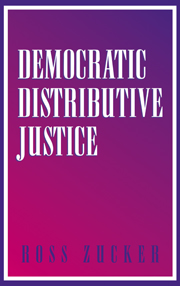Book contents
- Frontmatter
- Contents
- Acknowledgments
- 1 Democracy and Economic Justice
- Part I Unequal Property and Individualism in Liberal Theory
- Part II Egalitarian Property and Justice as Dueness
- Part III Egalitarian Property and the Ethics of Economic Community
- Part IV Democracy and Economic Justice
- 13 Democratic Distributive Justice
- 14 Democracy and Economic Rights
- Conclusions
- References
- Index
13 - Democratic Distributive Justice
Published online by Cambridge University Press: 02 December 2009
- Frontmatter
- Contents
- Acknowledgments
- 1 Democracy and Economic Justice
- Part I Unequal Property and Individualism in Liberal Theory
- Part II Egalitarian Property and Justice as Dueness
- Part III Egalitarian Property and the Ethics of Economic Community
- Part IV Democracy and Economic Justice
- 13 Democratic Distributive Justice
- 14 Democracy and Economic Rights
- Conclusions
- References
- Index
Summary
Which Axiom, though received by most, is yet certainly false.
HobbesWhen the majority, through the democratic process, commits a systematic injustice, such as a distributive injustice, is it being undemocratic or simply unjust? If it is undemocratic for a political system to be unjust, then a democracy must be morally committed to substantive justice, as part of what it means to be a democracy. But if it is not undemocratic to violate substantive rights, then a country need be committed only to preserving the electoral procedure in order to be a democracy. Thus, the nature of democracy's relation to justice underlies the central distinction between substantive and procedural democracy.
The essential characteristics of democracy, I argue, include the conditions necessary for attaining not merely political equality and popular consent, but also the primary economic rights of citizens. The concept of substantive democracy is, of course, not unprecedented. Its venerable tradition goes back to Locke's theory, in which the preservation of property is the chief end of democratic government. But while the objections raised to theories of substantive democracy are not insurmountable, procedural approaches have predominated the period from which we are emerging, and democracy's links to substantive rights have become obscure and uncertain. We therefore need to examine these links systematically.
Because there would be little value in introducing a vague and general notion of distributive justice into democratic ideals, I propose instead to synthesize democracy with a specific rule of distributive justice. In particular, I argue that the citizens of a democracy have the right to share equally in a portion of total income and wealth.
- Type
- Chapter
- Information
- Democratic Distributive Justice , pp. 269 - 286Publisher: Cambridge University PressPrint publication year: 2000



